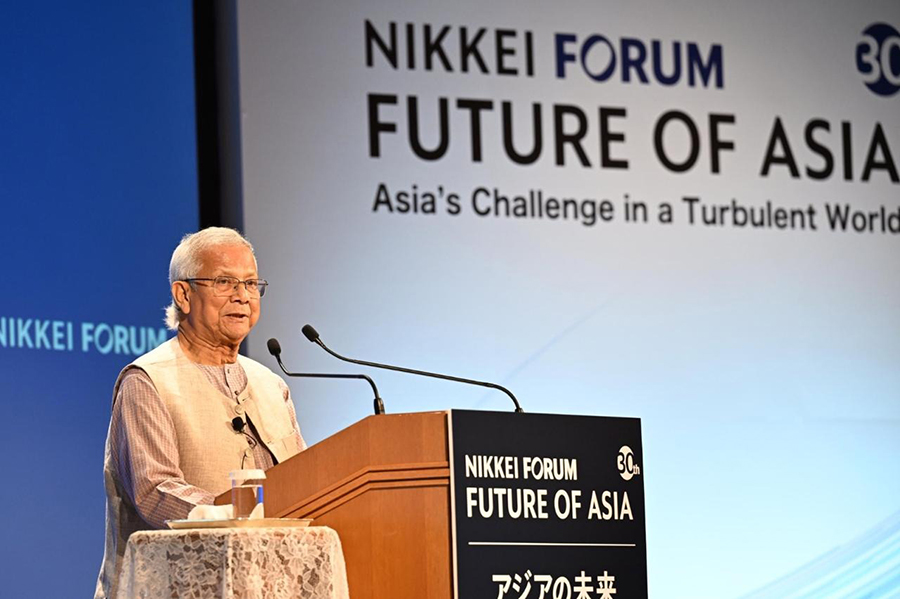
Published :
Updated :

Urging Asian nations to chart a new course of cooperation, inclusion, and sustainability, Chief Adviser Professor Muhammad Yunus on Thursday outlined a seven-point agenda aimed at transforming Asia into a beacon of shared prosperity by unlocking new opportunities.
"As we look to the future, I believe Asian nations can work together even more closely to address shared challenges and unlock new opportunities for prosperity," he said while delivering his keynote speech at the inaugural session of the 'Nikkei Forum: 30th Future of Asia' held here this morning.
"We need to build a clear path towards a shared future and shared prosperity," he added, presenting seven proposals to achieve this goal.
Highlighting the importance of transforming Asia’s interdependence into cooperation, Prof Yunus said Asia’s diversity—of economies, cultures, and political systems—is both its strength and its test.
"Our fates are increasingly intertwined. A supply chain disruption in one country ripples across borders," the chief adviser observed.
He said environmental degradation in one part of Asia affects rainfall patterns in another while political instability in one region impacts global energy and trade flows.
"Our job is to convert this interdependency into cooperation, not conflict; to invest in shared prosperity, not zero-sum rivalries," said Prof Yunus, also a Nobel laureate.
He advocated for forging robust economic and technical cooperation saying Asia needs a stronger and sustainable way to finance its development. “Regional development banks and financial institutions should take the lead in funding our growing needs.”
Stating that Asia is still one of the least connected regions in terms of trade, the chief adviser said, this lack of integration holds back investment and business opportunities. "We must act now to improve trade partnerships across the region. Asia should build a strong technology ecosystem—one that is inclusive, fair, and sustainable.
Emphasising the need to promote inclusion, empowerment, and sustainability, he said, 'We must not forget the billions who still live on the margins—disconnected from opportunity, vulnerable to shocks.'"
"My life’s work has shown that poverty is not created by the poor; it is created by the system. We must redesign that system. The world we inherited was built on assumptions of trickle-down economics, centralised control, and the maximisation of wealth,” Prof Yunus said.
He said there was a need to build a new architecture—one that promotes inclusion, empowerment, and sustainability at every level, adding that this is where Asia could lead.
Calling for a transformation of lives through investment in people, the chief adviser said: “Let us invest not just in infrastructure and industrialisation, but in people—through education, health, social business, and digital access.”
He focused on embracing the idea that profit and purpose can coexist—and that social business can transform lives where traditional markets and governments fall short.
Regarding the green transition, Prof Yunus stated that Asia is both a victim and a contributor to climate change.
He pointed out that rising sea levels threaten Bangladesh and the Pacific Islands, while glaciers in the Himalayas are melting, endangering freshwater supplies for billions.
"We need a Pan-Asian Green Transition—driven by youth, entrepreneurs, and communities. Let us support renewable energy cooperatives, climate-smart agriculture, and circular economies. Let us create platforms that allow grassroots innovators to scale across borders," Prof Yunus said.
He also underscored the need for taping the potentials of youth and shifting from job seekers to job creators.
Half of Asia's population is under 30, who are Asia’s greatest strengths and their creativity and energy should be at the center of our efforts, the chief adviser said.
"Our youth are ready—but they need the tools, trust, and freedom to shape their own futures. Social business, digital platforms, and microfinance can unleash a new wave of grassroots-led innovation," he said.
Prof Yunus said he always encourage young people not to wait to find a job but create one.
Noting that human being is born to become entrepreneurs, hr said "Build something that solves a problem. Be a job creator, not just a job seeker".
Finally, he said, in a turbulent world, people’s empowerment and grassroot leadership matters more than ever.
Asia must offer not just economic strength, but a new moral compass—one that champions peace over power, cooperation over competition, sustainability over short-term gain, the chief adviser said.
"We must move from wealth concentration to wealth distribution, from capitalism for profit to capitalism with purpose. In my country Bangladesh, we have seen how social business has uplifted millions...Let that be a lesson: when people are given dignity, trust, and a chance—they rise. Not just as workers, but as change-makers," the Chief Adviser said.


 For all latest news, follow The Financial Express Google News channel.
For all latest news, follow The Financial Express Google News channel.